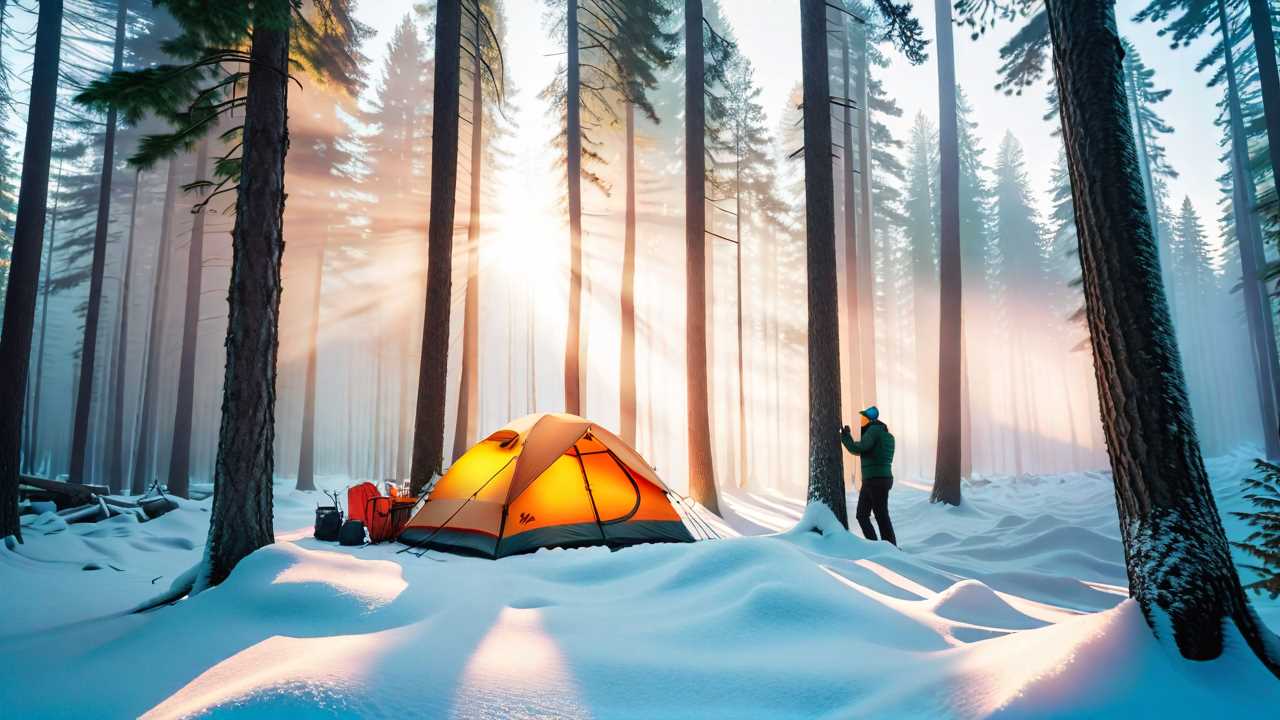
As you navigate the vast world of winter camping tents, consider this: amidst the icy winds and snow-covered landscapes, your shelter becomes your haven. But how do you choose the one that will truly stand as a stalwart against the winter's bite? Stay tuned to uncover the important factors that will guarantee your tent is not just a cover from the cold, but a warm sanctuary in the midst of the frosty wilderness.
Tent Size and Capacity
When selecting a winter camping tent, make sure that you choose a size and capacity that comfortably accommodates the number of campers and gear you plan to bring along. A good rule of thumb is to take into account a tent that offers a bit more space than the number of people it claims to accommodate. This additional room can provide a more comfortable experience, especially during extended stays in cold weather.
Additionally, keep in mind the gear you'll be bringing. If you have a lot of equipment or plan to store items inside the tent to prevent them from freezing, opt for a tent with vestibules or a larger capacity.
Take the tent's peak height into consideration as well. A higher peak height not only allows for easier movement inside the tent but also helps prevent a feeling of claustrophobia during longer periods spent indoors. This is particularly important during winter camping when outside conditions may limit the time you can spend outdoors.
Make sure to check the tent's dimensions and layout to ensure it suits your needs and provides a comfortable living space for your winter adventures.
Seasonality and Weather Resistance
When choosing a tent for winter camping, it's essential to take into account its seasonality rating and weather resistance. Look for tents specifically designed for winter or four-season camping, as they're engineered to withstand harsher conditions. These tents typically have stronger poles, reinforced stitching, and more robust materials to handle snow loads and strong winds.
Ensure the tent has a waterproof and durable rainfly to keep you dry during rain or snowfall. Seam taping on the rainfly and bathtub-style floors can prevent water from seeping in. Additionally, check for a tent with good ventilation to minimize condensation build-up inside.
Consider the tent's ability to withstand wind gusts; models with geodesic or dome shapes are often more wind-resistant. Snow skirts around the tent base can also help prevent drafts and keep snow from blowing inside.
Material and Insulation
Consider the type of material and level of insulation in a winter camping tent to guarantee warmth and protection from the cold weather. When choosing a tent for winter camping, pay close attention to the following:
- Material Quality:
Opt for a tent made of high-quality, durable materials such as ripstop nylon or polyester. These materials offer better resistance to harsh winter conditions and are more likely to withstand wind, snow, and cold temperatures.
- Insulation Type:
Look for tents with adequate insulation, such as double or triple-layer walls and floors. This additional insulation helps retain heat inside the tent, keeping you warm during cold nights.
- Ventilation:
While insulation is important for warmth, proper ventilation is just as essential to prevent condensation buildup inside the tent. Look for tents with adjustable vents or mesh panels to allow for airflow without compromising on warmth.
Weight and Portability
Opt for a winter camping tent that prioritizes lightweight construction and ease of transport without compromising on durability. When contemplating weight and portability for your winter camping tent, every pound counts, especially if you plan on trekking through snowy terrain. Look for tents made with lightweight materials like high-tenacity nylon or Dyneema composite fabrics, known for their strength-to-weight ratio. These materials guarantee your tent is sturdy yet easy to carry.
Additionally, check the tent's packed size and shape. Tents that pack down small and can fit into a compact carrying bag are ideal for backpacking trips in the winter. Features like compression straps or divided stuff sacks can help condense the tent further, making it easier to fit into your backpack alongside other gear.
Remember to take into account the weight distribution among campers if sharing the load. Some tents have separate stuff sacks for poles, fly, and tent body, allowing you to divide the weight among multiple backpacks.
Prioritizing weight and portability ensures that your winter camping experience is more manageable and enjoyable.
Frequently Asked Questions
Can I Use a Summer Tent for Winter Camping?
Sure, using a summer tent for winter camping isn't ideal. Winter tents are designed for cold conditions with stronger materials, better insulation, and sturdier frames to handle snow loads. Invest in a proper winter tent for safety and comfort.
Do I Need a Special Sleeping Bag for Winter Camping?
You do need a special sleeping bag for winter camping to guarantee warmth and comfort. Look for bags with lower temperature ratings, insulated baffles, and draft tubes. Consider your sleeping habits and the climate to choose the right one.
How Do I Prevent Condensation Inside the Tent?
To prevent condensation inside the tent, make sure to ventilate well by slightly opening vents or windows. Use a tent with good airflow and avoid cooking inside. Wipe down any moisture that accumulates to keep the interior dry.
Can I Cook Inside a Winter Camping Tent?
Cooking inside a winter camping tent is not recommended due to safety concerns. The risk of carbon monoxide poisoning and fire hazards is high. Always cook outside the tent in a well-ventilated area to guarantee your safety.
What Type of Stakes Are Best for Winter Camping?
For winter camping, sturdy stakes are supreme. Seek out strong, stainless steel stakes. These will secure your shelter in snow and withstand icy winds. Stay safe and sound with stakes that stand strong.
 SportsHollywoodLifestyleFashionHome & GardenTrendsPrivacy PolicyTerms And Conditions
SportsHollywoodLifestyleFashionHome & GardenTrendsPrivacy PolicyTerms And Conditions
